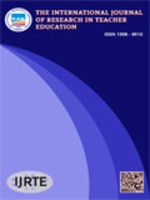A Qualitative Study into English Language Teachers’ and Students’ Beliefs and Practices in Turkey
A Qualitative Study into English Language Teachers’ and Students’ Beliefs and Practices in Turkey
Keywords:
-,
___
- Bada, E. & Okan, Z. (2000). Students’ language learning preferences. TESL-EJ, 4, 3. Available at http://www.tesl-ej.org/wordpress/issues/volume4/ej15/ej15a1/
- Bandura, A. (1986). Social foundations of thought and action: A social cognitive theory. Englewood Cliffs, NJ: Prentice-Hall.
- Borg, M. (2001). Teachers’ beliefs. ELT Journal, 55 (2): 186-188.
- Borg, S. (2006). Teacher cognition and language education. London: Continuum.
- Brown, C. A. & Cooney, T. J. (1982). Research on teacher education: A philosophical orientation. Journal of Research and Development in Education, 15, 4, 13-18.
- Calderhead, J. (1996). Teachers: Beliefs and knowledge. In D. C. Berliner & R. C. Calfee (Eds.), Handbook of Educational Psychology (pp. 709-725). New York: Macmillan.
- Duffy, G., & Anderson, L. (1984). Teachers’ theoretical orientations and the real classroom. Reading Psychology, 5, 97-104.
- Gahin, G. H. (2001). An investigation into EFL teachers’ beliefs and practices in Egypt: An exploratory study. Unpublised PhD thesis. University of Exeter, UK.
- Glesne, C., & Peshkin, A. (1992). Becoming qualitative researchers: An Introduction. New York, NY: Longman.
- Grossman, G. M., Onkol, P. E., & Sands, M. (2007) Curriculum reform in Turkish education: Attitudes of teacher educations towards change in an EU candidate nation. International Journal of Educational Development, 27, 138-150.
- Hancock, E. S. & Gallard, A. J. (2004). Pre-service science teachers’ beliefs about teaching and learning: The influence of K-12 field experiences. Journal of Science Teacher Education, 15, 4, 281-291.
- Hoffman, J. V., & Kugle, C. L. (1982). A study of theoretical orientation to reading and its relationship to teacher verbal feedback during reading instruction. Journal of Classroom Interaction, 18, 2-7.
- Karavas, E. (1993). English language teachers in the Greek secondary school: A study of their classroom practices and their attitudes towards methodological and material innovation. Unpublished PhD thesis. University of Warwick, UK.
- Kern, R. G. (1995). Students’ and teachers’ beliefs about language learning. Foreign Language Annals, 28, 1, 72-92.
- Maiklad, C. (2001). The beliefs and practices of Thai English language teachers. Unpublished PhD thesis. University of Exeter, UK.
- MEB (2006). The regulation of foreign language teaching. Offical Journal, 26184.
- Nunan, D. (1989). Hidden agendas: the role of the learner in programme implementation. In R. K. Johnson (Ed.), The second language curriculum (pp. 176-186). Cambridge: Cambridge University Press.
- Pajares, F. (1992). Teachers beliefs and educational research: Cleaning up a messy construct. Review of Educational Research, 62 (3), 307-332.
- Richards, J. C. & Lockhart, C. (1994). Reflective teaching in language teacher education. Cambridge: Cambridge University Press.
- Richards, J. C. (1998). Beyond Training. Cambridge: Cambridge University Press.
- Seban, D. (2008). Öğretmenlerin yazılı öğretimi hakkındaki inanç ve uygulamalarına durum çalışmaları üzerinden bir bakış. Elementary Education Online, 7 (2), 512-521.
- Shavelson, R. J. & Stern, P. (1981). Research on teachers’ pedagogical thoughts, judgements, decisions and behaviours. Review of Educational Research, 51, 455-498.
- Spratt, M. (1999). How good are we at knowing what learners like? System, 27(2), 151-155.
- Yim, L. W. (1993). Relating teachers’ perceptions of the place of grammar to their teaching practices. Unpublished Master’s thesis, National University of Singapore. About the Author(s)
- Mehmet Sercan Uztosun is a research assistant at English Language Teaching Department of Çanakkale
- Onsekiz Mart University and currently he is an EdD candidate in TESOL programme at University of Exeter. He
- is particularly interested in pre-service teacher education, teaching speaking and action research as a methodology.
- ISSN: 1308-951X
- Başlangıç: 2010
- Yayıncı: Eğitim Araştırmaları Birliği Derneği
